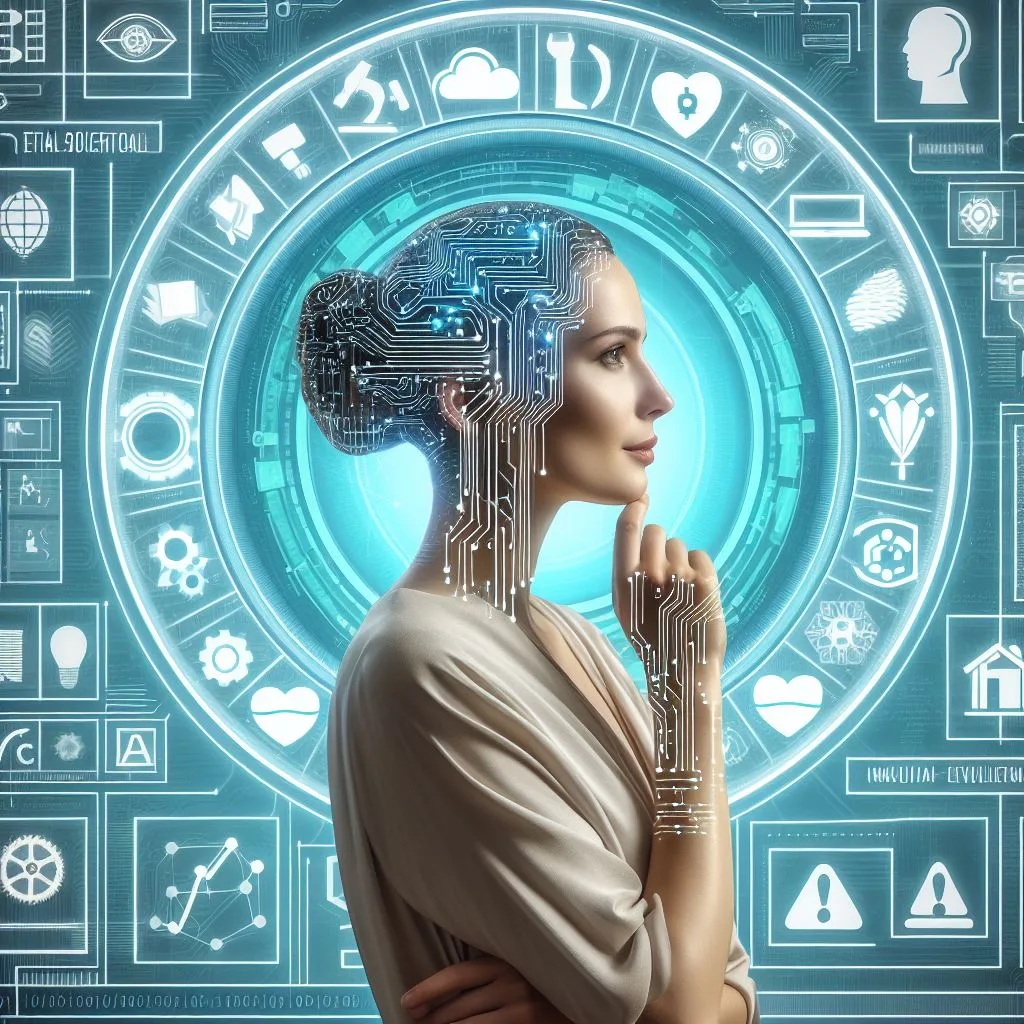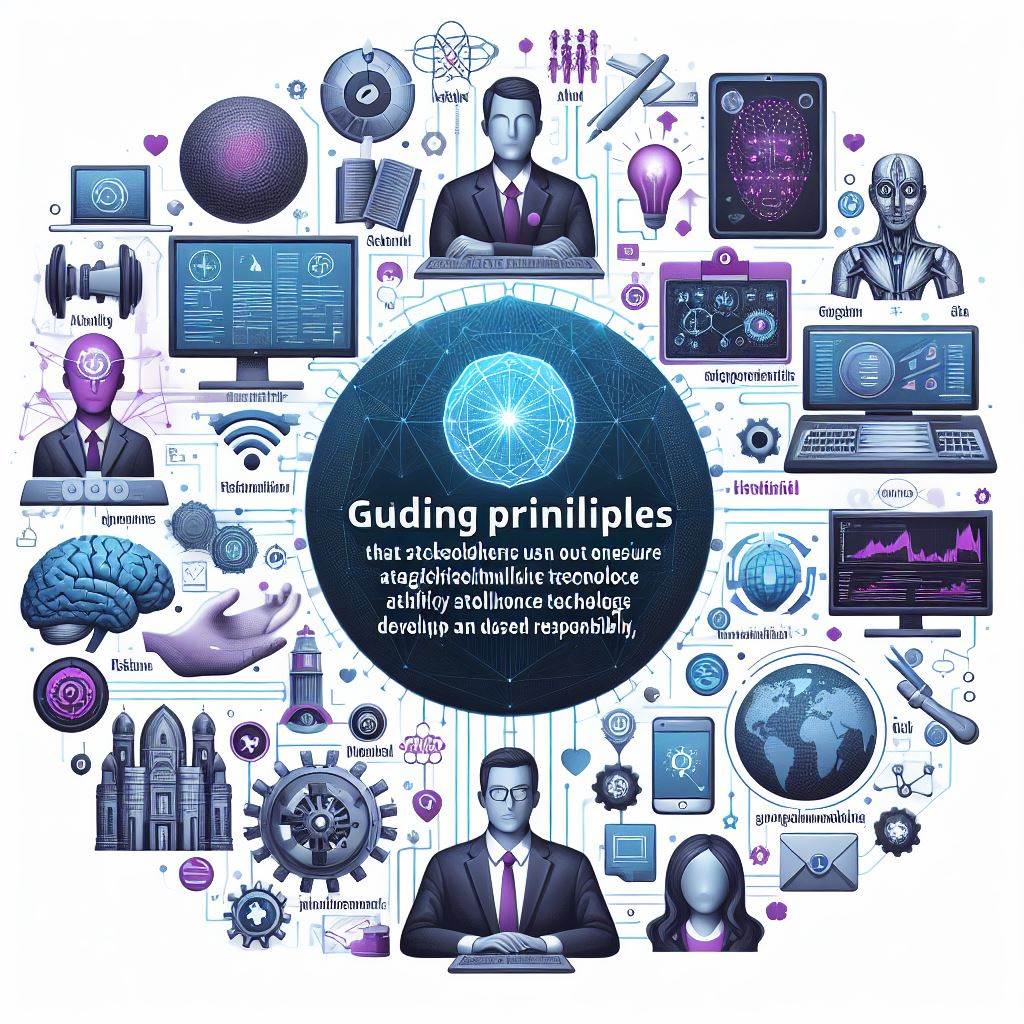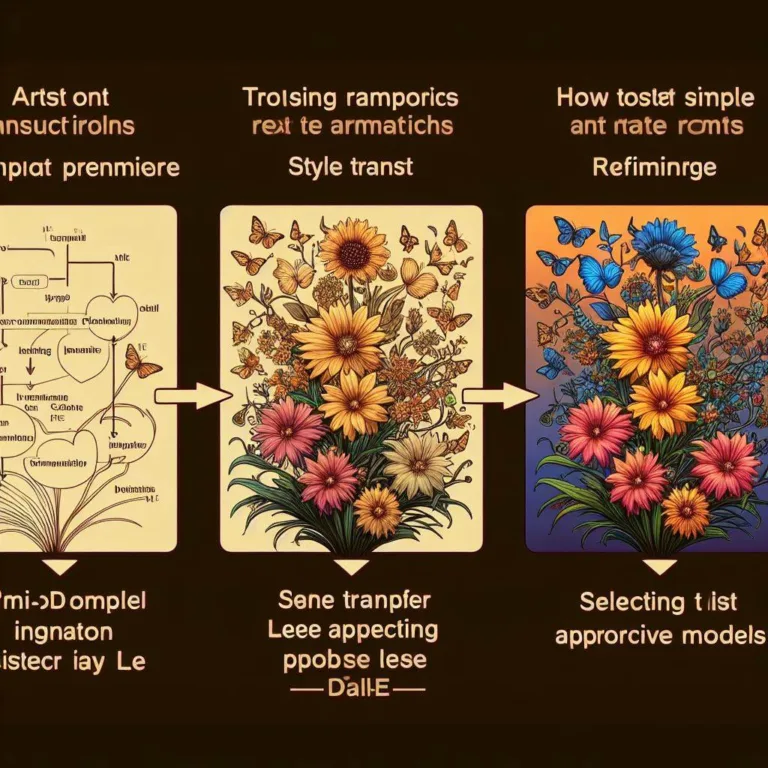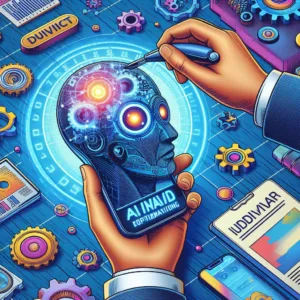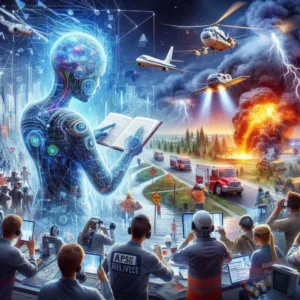Welcome to our investigation of the fascinating and more important realm of AI morality. In today’s briskly advancing technological countryside, the ethical concerns surrounding artificial intelligence (AI) have become more crucial than always. From ensuring justice and accountability to addressing biases and society impacts, navigating the complicatedness of AI ethics is essential for building a mature and equitable future.
In this guide, we’ll investigate the intricacies of AI ethics, contribution insights, and procedures for effectively addressing moral dilemmas in AI exercise. Whether you’re a technologist, policymaker, or simply dignitary curious about the ethical associations of AI, this resource aims to specify valuable perspectives and practical approaches to guide you along the route, often watering the ethical challenges owned by AI development and deployment.
Join us as we investigate the intersection of science and morality, and find how embracing moral principles can shape the future of AI beneficially. Let’s embark on this journey together, as we navigate the interesting world of AI morality and work towards building a more ethical and all-encompassing technological countryside.
Ethical Challenges in Artificial Intelligence
Understanding the Landscape
In the briskly developing domain of machine intelligence (AI), ethical challenges have arisen as a focus of dispute. As AI electronics enhance more joined into various aspects of our lives, concerns concerning solitude, bias, responsibility, and transparency have become more evident. It’s crucial to include the versatile type of these challenges to guide along the route, often over water the moral complicatedness efficiently.
Addressing Bias and Fairness
One of the primary righteous challenges in AI revolves around bias and justice. AI schemes, frequently prepared on real data, can derive and bolster biases present in those datasets. This can bring about prejudicial effects, strengthening existing prejudices in humankind. Addressing bias demands not only mechanics answers but also a whole approach that includes different outlooks, righteous directions, and continuous judgment means to ensure justice and impartiality in AI uses.
Collaborative Solutions for a Responsible Future
To tackle moral challenges in machine intelligence, cooperation is key. It demands a concerted exertion from technologists, policymakers, ethicists, and organizations loose to cultivate foundations and principles that plan out ethical concerns. Organizations must select understandable practices, implement healthy government constructions, and promote open dialogue to lighten risks and build count on AI electronics. Through cooperation, we can guide along the route, often water the moral challenges of AI, and guarantee that these powerful finishes are redistributed responsibly for the benefit of all. Learn nearly righteous AI practices and in what way or manner they shape the future of science.
Strategies for Ethical Implementation of AI
Embracing Ethical Frameworks
In the world of machine intelligence (AI), ethical exercise is superior to promoting trust and guaranteeing responsible use of these effective electronics. One active strategy searches to adopt strong ethical foundations. These foundations specify directions and principles to rule the incident, arrangement, and usage of AI arrangements. By heeding settled ethical principles, institutions can guide along the route, often over water complex righteous dilemmas, and form conversant resolutions that prioritize social happiness and human principles.
Prioritizing Transparency and Accountability
Transparency and accountability are cornerstones of moral exercise in AI. Organizations must supply instructions on transparency by open ideas about the capacities, disadvantages, and potential risks associated with AI arrangements. Additionally, demonstrating devices for responsibility is essential to guarantee that things and organizations are held being the reason for the consequences of AI-compelled decisions. This involves achieving processes for analyzing AI algorithms, providing alternatives for individuals distressed by AI-connected determinations, and fostering a breeding of trustworthiness inside the organization.
Continuous Learning and Adaptation
The ethical exercise of AI is a continuous journey that demands constant learning and naturalization. As AI electronics develop and societal principles shift, arrangements must wait watchful and responsive to arising righteous challenges. This requires investing in moral preparation and instruction for AI developers and experts, being cognizant of new developments in AI morality research, and energetically charming partners to ask for responses and address concerns. By fostering the idea of constant bettering, arrangements can proactively address ethical concerns and support the law of fairness, responsibility, and transparency in their AI actions.
Join Us in Shaping Ethical AI
Are you passionate about fostering ethical AI practices? Join our community dedicated to shaping a future where AI is deployed responsibly for the benefit of all. Together, we can advocate for ethical frameworks, promote transparency and accountability, and foster a culture of continuous learning and adaptation. Join us today and be a part of the ethical AI movement. Together, let’s build a better future powered by responsible AI technologies
Navigating Ethical Dilemmas in Artificial Intelligence
Identifying Ethical Quandaries
Navigating moral crises in machine intelligence (AI) requires a sharp understanding of the complex intersections between electronics and honesty. One of the primary challenges display or take public labeling moral quandaries owned by AI systems. These crises can stand from issues to a degree of bias in algorithms, encroachment of privacy, or the potential for AI to infuriate existent society prejudices. By recognizing these righteous challenges, collaborators can start to plan effective blueprints for focusing on the ruling class.
Balancing Innovation Accompanying Ethical Considerations
A key aspect of guiding along the route, often over water righteous crises in AI includes striking a sensitive balance between novelty and righteous considerations. While mechanics progress offers a huge excuse for progress and growth, they still raise deep righteous questions. Arrangements and policymakers need to consider the moral associations of AI pushes from the beginning and merge ethical standards into the design and exercise process. By proactively discussing moral concerns, stakeholders can underrate potential harm and be dramatic about society’s benefits of AI sciences.
Foster Dialogue and Collaboration
Effective navigation of righteous crises in AI makes it necessary to promote open dialogue and cooperation with different shareholders. By bringing together masters from miscellaneous fields—including electronics, morality, law, and sociology—arrangings can gain valuable observations and views on complex righteous issues. Additionally, engaging accompanying jolted societies and pursuing input from things distressed by AI electronics can help guarantee that ethical concerns are sufficiently focused on. By advancing transparency, inclusivity, and cooperation, colleagues can agree to guide along the route, often over water ethical crises in AI, and advance accountable use of these strong technologies.
Exploring Gray Areas: Addressing Ethics in AI
Embracing Complexity in Ethics
Exploring silver areas and focusing on ethics in artificial intelligence (AI) demands a nuanced understanding of the complexities complicated. Ethics in AI is not always black and white; skills are often inconclusive situations and dilemmas that demand careful concern. It’s essential to accept and embrace this complexity to evolve effective game plans for ethical AI development and arrangement. By recognizing and guiding along the route, often watering these gray areas, shareholders can promote accountable AI practices and mitigate potential risks.
Implementing Ethical Guidelines
One approach to discussing ethics in AI is the implementation of inclusive ethical directions and frameworks. These guidelines are a part of a roadmap for righteous decision-making throughout the AI lifecycle, from design and happening to deployment and judgment. By adhering to settled ethical principles, in the way that fairness, transparency, accountability, and privacy, arrangements can navigate the moral complexities of AI more effectively. Additionally, balanced ethical appraisals and audits can help ensure that AI orders remain aligned accompanying ethical principles and values.
Join the Conversation on Ethical AI
Are you interested in touching the conversation on righteous AI? Explore our platform to engage accompanying experts, share visions, and contribute to the incident of ethical AI practices. Together, let’s guide along the route, often water the gray districts of AI ethics, and work towards a future where AI sciences are deployed responsibly, about the welfare of mankind, and for the benefit of society.
Conclusion: Shaping a Responsible Future accompanying AI Ethics
In conclusion, navigating the moral landscape of artificial intelligence (AI) demands concerted work from stakeholders across various subdivisions. As AI technologies touch advance, it’s crucial to plan out ethical considerations to guarantee that these powerful forms are used responsibly and for the benefit of people. By embracing robust moral frameworks, advancing transparency and accountability, and supporting open dialogue and cooperation, we can navigate the complex moral dilemmas inherent in AI. Through unending learning, agreement, and a commitment to ethical standards, we can shape a future where AI sciences enhance human health while upholding fundamental values of justice, transparency, and respect for individual rights. Together, allow work towards a world place AI is a force for good, guided by moral principles and hard-working to advance the greater adapted all.

